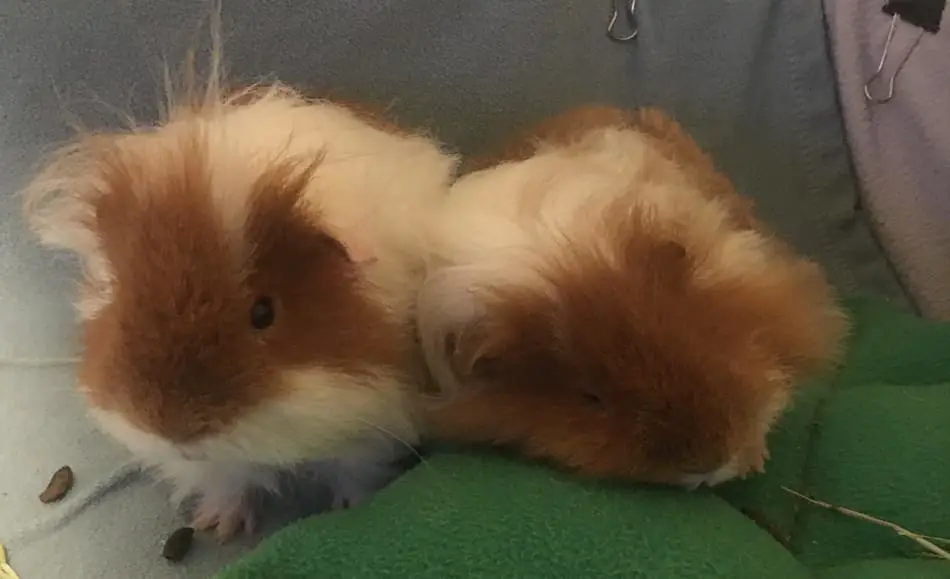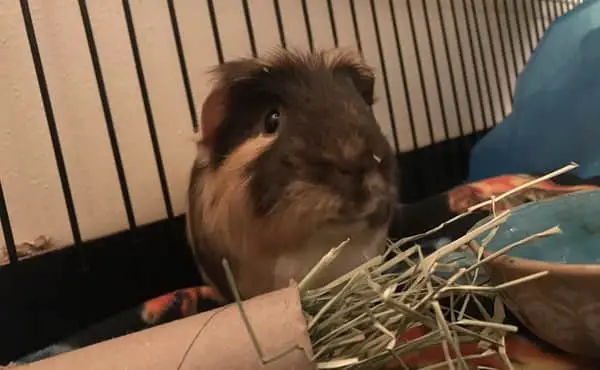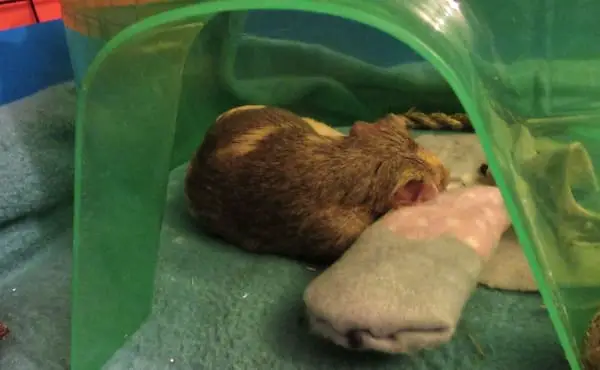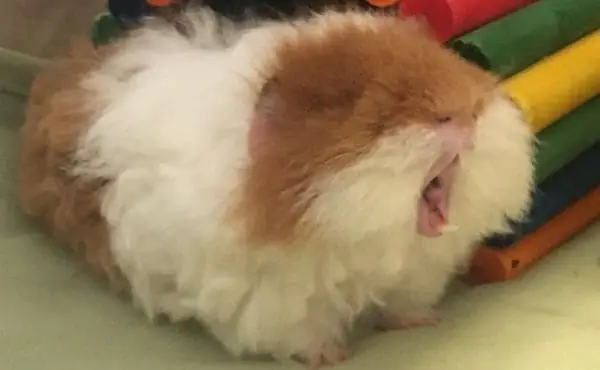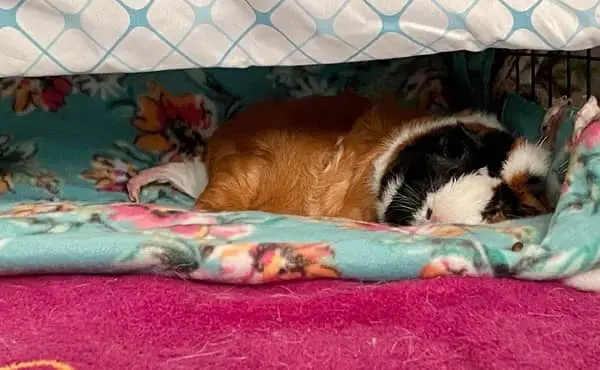Guinea pigs bring joy and fun into our homes with lots of personality and affection, but sometimes it would be nice if they could simply speak to us so we could figure out what is going on when they do odd things, like rolling over when petted. Guinea pig language is quite different from ours, but we humans can learn if we pay close attention to our furry friends.
Why does my guinea pig roll over when I pet him? The most likely reason for this behavior is that your guinea pig feels completely safe and relaxed with you. However, depending on the timing and context, it could also indicate illness, irritation or fear, or high body temperature.
In this article we will discuss how feeling safe and relaxed in your presence is likely behind this behavior, as well as possible illness, irritation, or fear that could be driving the behavior. Finally, we will briefly cover the possibility of high body temperature causing your pal to roll over.
Safe and Sound
One of the most important things for guinea pig owners to remember is that guinea pigs are natural prey animals. As such, their stress and anxiety levels are high compared to other domestic companions such as cats or dogs.
Wild guinea pigs are constantly on alert for predators like wild cats, wolves, owls, and even snakes. Guinea pig senses are heightened and sharp, and they are always ready to freeze or flee when they feel threatened.
All this is to say that our domestic companions retain these instincts, and are easily driven to stress or anxiety, even in our safe, secure homes. To such a small creature almost everything is scary, including unidentifiable or sudden noises, unfamiliar smells, other animals, and sometimes even us!
So, if your guinea pig rolls over (especially onto its side) when you pet it and it displays no signs of stress, fear, or anxiety, your pal likely feels completely relaxed and safe in your company.
To say this is a compliment would be an understatement—you have made your tiny, worrisome friend feel safe enough to expose their delicate belly when (in most cases) all their natural instincts are telling them not to.
We humans are simply enormous to a little guinea pig, and our bodies even give off a certain scent to prey animals that signals to them that we may be dangerous. To the point, our pets’ wild cousins are indeed still hunted for various reasons in their native habitats.
Further, most of us cannot resist trying to pick up these little balls of fluff for a cuddle, which is inherently stressful for guinea pigs and other small mammals. Being picked up is unnatural for them and would only mean one thing—they are about to become a meal.
However, properly handled piggies become socialized with humans quite quickly, and many come to love being picked up to spend some time in our laps.
You may have gotten lucky with a particularly outgoing or well-handled guinea pig, or you are excellent at bonding with your furry friend. Perhaps a bit of both!
Either way, if your piggie is rolling over when petted and displaying other signs of contentment or happiness like high-pitched squeals (also called ‘wheeking’), deep, relaxed purring, nose-rubbing, or ‘popcorning,’—when a guinea pig literally jumps for joy—your piggie is about as happy as it will ever be.
Whatever it is you are doing, keep it up, because your pal just loves it! If your guinea pig is rolling over when petted but displaying other contextual signals that do not translate to “I am overjoyed please keep petting me,” it is time to rule out illness as a factor.
WebMD but for Piggies
Hailing from various mountainous, forested, and rocky habitats in South America, guinea pigs are relatively hardy creatures for being so small, fluffy, and adorable. In addition to being social creatures, they are also prolific groomers known for keeping themselves exceptionally clean.
These characteristics combined make guinea pigs quite resilient when it comes to a lot of things, but they are still susceptible to certain ailments, just like anyone or anything else. This is especially true for domestic guinea pigs, who are sometimes kept by breeders and pet stores in conditions that favor illness-causing bacteria and parasites.
If your guinea pig is rolling over when you pet it and exhibits signs of discomfort or pain, it could be experiencing an illness and is sensitive to your touch. There are several common ailments from which a guinea pig could suffer, all of which have their own specific signs and symptoms.
However, there are a few nonspecific symptoms to be aware of so you can determine if illness is causing your pal to roll over before you try to narrow it down. Some of these include:
- Hunched posture
- Aversion to being touched or handled
- Lethargy
- Decreased appetite or thirst
- Weight loss
- Labored breathing
- Disheveled coat
If you notice your guinea pig is displaying these signs, it may be sick, so a call to the veterinarian is advised. Most ailments can be treated with relative ease if they are caught quickly enough.
For example, guinea pigs have extremely sensitive gastrointestinal (GI) tracts and some of the most common afflictions for them are GI stasis and diarrhea. As its name suggests, GI stasis occurs when food material slows or completely stops in a guinea pig’s GI tract, creating gas, discomfort, or a blockage.
GI stasis can be fatal if not addressed right away. Similarly, with diarrhea, something introduced into the piggie’s delicate system can create an imbalance in its good gut bacteria, creating loose stools leading to dehydration. In severe cases this can also be fatal, but vigilance and a vet visit can quickly right these conditions.
Other common ailments for guinea pigs include respiratory infections, (which are much more serious for our tiny friends than they are for us), parasites like mites, and surprisingly—scurvy.
Many animals manufacture their own vitamin C, but guinea pigs (and us primates!) are not among them. Vitamin C is incredibly important for these little piggies, otherwise they will develop scurvy which can lead to serious complications such as bleeding under the skin, muscles, and membranes of the skull, brain, and intestines.
It also affects the health of skin, joints, and gums. In addition to some of the non-specific symptoms listed above, a vitamin C-deficient guinea pig may have diarrhea, walk with a limp, and/or have swollen feet or joints.
Call your veterinarian right away if you suspect scurvy and remember to give them plenty of vitamin C-rich, tasty snacks like bell pepper, spinach, and broccoli. They will think they are simply getting a delicious treat, but you will know you are taking care of their health—win-win!
If your guinea pig does not display signs of overt happiness but does not appear ill either when they roll over, it could be that they are irritated or fearful of the situation or environment.
Sassy Pants or Fear Factor?
For all the cute, affectionate, and entertaining things our piggie pals do, they are also full of sass and are quick to let us know when they do not like something. Just like us, they have their own personalities and preferences for things they like or dislike. They have favorite (and least favorite) foods, toys, places to hide or sleep, etc.
They also have favorite places they like to be petted and places you would be smart to avoid (typically feet, backside, and belly, but it truly does depend on the individual.) Sometimes, you may accidentally pet one of these “no-no” places, and your guinea pig might be telling you in its special, hard-to-translate way, that you better stop.
Guinea pig language is highly contextual, so pay close attention to your piggie when it rolls over and look for signs of annoyance or irritation. Unlike some of their other domestic counterparts, guinea pigs are not shy when it comes to letting us know we messed up!
Unlike the deep, relaxed purr you hear when your piggie is content, you may hear a higher-pitched purr if your pal is annoyed with you. Your guinea pig may also hiss and/or toss its head at you if you have offended it.
Outside of irritation, your guinea pig may also, unfortunately, be experiencing fear. If your piggie is rolling over when you pet it and displaying other signs like a short, apprehensive purr, a clipped or high-pitched squeak, and/or freezing in place, it could be fearful of something around it.
When you pet your pal, are you in a safe, quiet space familiar to it or are you in a large, loud, or bright room? Are there loud or rambunctious children or animals in the area? Are you giving your companion plenty of notice before you pet it?
Make sure not to surprise your piggie with pets, always let them know it is coming, and consider these things when you interact with your furry friend—a gentle, safe, quiet environment is much more conducive to a happy piggie.
Barring any of these situations, if your companion is rolling over when you pet it, there is one more thing that might be happening: heat.
Too Toasty
We mentioned above that guinea pigs come from South America, but that does not mean they tolerate extreme temperatures very well. Guinea pigs are burrowing animals, meaning they spend most of their lives, when they are not collecting food, underground, which is perfect for building cozy nests in the winter and keeping nice and cool during the summer heat.
Additionally, they are crepuscular, meaning they are usually only active during the dawn and dusk hours when it is coolest outside. Utilizing their environment in this way is how guinea pigs do most of their body temperature regulation.
Without the ability to use the environment to their advantage, however, our piggies are susceptible to heat stress and heat stroke.
If your guinea pig is rolling over and displaying signs of listlessness or lethargy, drooling, rapid breathing, and/or pale gums, it might be overheated, and will not necessarily want to be touched because, well, who would when it is too hot?
It seems a little less likely that this might be the case if it only happens when you pet them, but to be safe, make sure the room in which your piggie lives is between 65- and 75-degrees Fahrenheit, and try to keep their enclosures away from windows and direct sunlight that could heat them up.
Unlike some of the other ailments we discussed earlier, heat stroke is a little more difficult to come back from without emergency treatment, so prevention is key.
Conclusion
If your guinea pig rolls over when you pet it and displays classic signs of a happy pig like relaxed purring and nose rubbing, congratulations—you are guinea pig-whisperer! Your pal is completely content to be with you and feels safe in your home.
However, if your piggie is showing you different signs like a hunched posture or lethargy when they roll over, they could be sick. Call your vet right away to get your furry friend back on their tiny feet again. Additionally, your guinea pig could be offended at the audacity you had to pet it in a place it did not want, or it could be a little scared of something around it.
Make sure you pay close attention to your friend’s contextual communication to help it remain happy and calm. Finally, there is a small chance that heat could be affecting your piggie, so take steps to ensure the environment is nice and cool.
Chances are, your relationship with your furry friend is excellent, but if something is off, do not fear—these things happen and if you pay close attention to what your pal is telling you, you will both be happy and healthy and enjoying each other’s company in no time.

